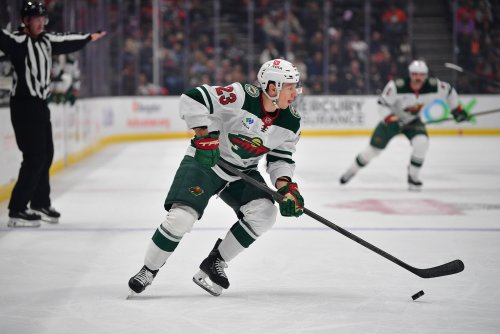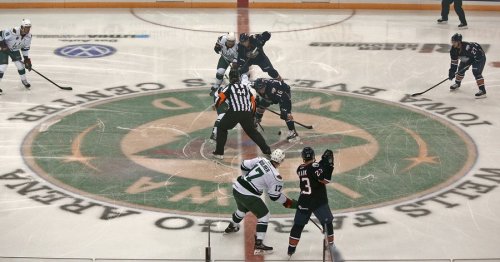
Regarding the translation, Francesca said:
Here's the interview:
"There's no right or wrong"
Along with other Andy Rufener clients, Niederreiter is currently training under Vladimir Jursinov in Romanshorn.
The heat has reached record levels this week and you are already skating, doesn't this feel wrong?
I also train outdoors daily. I start very early in the morning and try to stay in the shade as much as possible. The ice rink is pleasantly cool, which results in a good temperature mix. However, I have trouble sleeping.
The season ended only two months ago. Why are you resuming on-ice training so early?
Mainly because of Wladimir Jursinow. The 75-year-old can teach me so much. He's rarely happy and that's his beauty.
Concretely, what is Jursinow asking from you?
That I refine my technique. Many little things get forgotten during the season and in Romanshorn each element is practised again.
You spend most of the summer in the weight room. You are 1.88 m (6'2") tall and weight 95 kg (210 lbs). Where do you stand in your physical development?
I want to keep this weight. When you reach a certain size, it's only a matter of fine tuning. Weighting 105 kg (231 lbs) is not my goal. The trick is to not lose weight during the season. At a certain point I weighted only 90 kg (198 lbs) last season, I was clearly too light.
Hockey is a team sport, but while training in the pre-season, you're rather an individual athlete.
I prefer to train individually with one of my two personal trainers, Thomas Berger and Michael Bont. It's important for me. I'm a person who likes to talk and I don't want to spend 3 hours in the weight room instead of the necessary two and a half because of it.
Moreover, you usually take private skating lessons for 10-14 days in Portland.
I'll do it again this year. Learning to skate even only a hundredth of a second faster can help me. I want to become a little faster every year. Skating is where I have the biggest improvement potential.
Spring 2014 you came back home after a very good first season with Minnesota, this year you did even better. Was there a moment when you realised: I made the breakthrough?
After the 2013/14 season I definitely knew that a lot is possible. I could then sign a new three-year contract in September. For the first time since long, I can now wind down and work out without stress. I know where I'm going to play. Before, I was always somehow under pressure and in the dark. First with the New York Islanders, then followed the trade and last year's late renewal. But of course, I've already set my next goal.
And that would be?
A big objective is to score more than 20 goals again. Scoring 30 would be even better. I want to gain more ice time and establish myself in the first two lines.
Although you absolutely wanted to stay in Minnesota, it took till mid September until your future with the team finally got sorted out. Did this put a strain on you?
The team wanted a six-year extension, I wanted to sign only for three years and we also had to find a financial compromise. The general manager has to think long-term and can't blow money on me that he then later needs for keeping another valuable player.
You are now earning $8 million in three years. Can you stil remember your salary as an apprentice heating installer?
If I'm not mistaken, the first year I earned 600 Swiss francs ($639) per month. The second year it would have been 800 ($852) and the third year between 1.000 and 1.200 ($1065-1278).
You interrupted your apprenticeship very early. With your kind of talent, did you ever feel that this was a great risk?
I stopped immediately vocational school, but kept working. I had a great instructor, but the commute between construction site and ice rink became too much for me. My mental trainer advised me to drop out, because the double workload would burn me out, especially physically. The conversation with my parents was not easy. In this regard, my father is old school: first complete the apprenticeship and then focus on sports. My mother saw it less tightly.
And now, at age 22, you're a multi-millionaire.
That's special. Some days, I'm aware of this, but other days I have trouble grasping how much money I earn. I try not to think about it and I manage to do so quite well.
You come from a working class family. Does your modest upbringing affect how you handle money or do you spend it carelessly sometimes?
If I absolutely want something, I don't think about it for too long and buy it straightaway. But you can't buy a new car every year or God knows what else. You must be clever and save enough money for the time after retirement.
You decided that playing in the North American Junior Hockey League would be the best for your development and went to Portland, Oregon as a 17-year-old. Were you homesick sometimes?
That was a big issue. The nine-hour time difference made contacts via Skype difficult. My parents visited me once or twice. For me however, so much was so new that I didn't get bored and hardly had any time to think about the situation. Nevertheless, at Christmas or birthdays I felt very lonely.
How do teams take care of foreign junior players?
Mainly via billet families. I got a very good one. We're still in contact and I visit them when I'm in Portland. I'm very grateful to these people. When I arrived, I could practically speak no English. After half a year I could understand almost everything, after a year I was able to actively master the language.
Did you grow up faster than your peers?
Yes, that's for sure the biggest difference between those who go to North America as juniors and those who remain in Switzerland. You have to deal with money and bills, learn to take care of laundry. I'm the youngest in the family and was often surrounded by older people, beginning with my two sisters. My closest friends are also all older than me.
Every year, Swiss juniors leave for North America. Would you advise everyone to take the plunge if given the opportunity?
You left HC Davos, where you were coached by Arno Del Curto, an excellent instructor. Did this make your decision more difficult at the time?
I played 3 games in the 2009 NLA playoffs. During the semi-finals I had to decide wether I'd stay or go. I wanted to make the move, I wanted to be closer to the NHL. During the playoffs I told Arno that I wanted to leave the team and go to the U18 World Championship in Canada to showcase my skills. He wasn't happy and he lambasted me. But all worked out perfectly. The coach of the Canadian U18 team was also the coach of the Portland Winter Hawks and he absolutely wanted me.
I think it's important to not have too high expectations and to enjoy, test and learn. Who thinks to play right away, underestimates the league. I could instantly play nine games with the New York Islanders, things were going well, and I was hoping to maybe stay the whole season. But nothing is handed to you in this league, you have to earn it, and I was sent back to Juniors.
You were the youngest player in the New York Islanders' team history. Expectations were high and you couldn't fulfil them as time went on. You weren't even 20 years old. A glaring experience?
In the second year I got in no man's land. The Islanders didn't want to send me to Juniors anymore but as a 19-year-old I was too young to play with the farm team in the AHL. In addition, I had an injury at training camp. I came back after six weeks, but got almost no ice time on the fourth line and then suffered a concussion. It was a constant battle that gnawed at my confidence.
How big was the mental crack?
The situation was clearly very difficult. But as a young man you have to learn to deal with setbacks. Previously everything went only forward. I began to doubt myself and instead of trusting my strengths, I began to copy players that were favoured over me.
Did you seek help from your mental trainer or a sport psychologist?
I started working with my mental trainer when I was 14. My mother thought that I should not only train my body, but also my mind. Whenever I have self-doubts, I call my mental trainer. Sometimes a word or a thought are sufficient, and all is well again. I haven't called her in a long time. After almost ten years I now know how to correctly deal with different situations.
Because of labor disputes, the 2012-2013 NHL season started only in the middle of January. At the behest of the New York Islanders, you didn't spend the lockout in Europe, but in the AHL, where you finally had to stay the whole season. The AHL is notorious for it's hardness and long bus rides. What's cliché, what's reality?
The league is really brutally hard. You play on Friday, Saturday and Sunday, Monday is free, then three days of training. Sundays, the level is not very high because everyone is tired. In the Eastern Conference you actually almost always travel by bus, in the Western Conference they fly indeed, but not in a private jet like in the NHL.
You once described the trade to Minnesota in summer 2013 as a booster.
Hockey is the number one sport in Minneapolis. Can you calmly walk down the street?
I live in the city centre and people recognise me more and more on the street. In the US people speak to you directly, in Switzerland they whisper: "Is that him or not?".
Do you feel at home in Minneapolis or more like on a very long business trip away from Chur?
Since I live in a nicely furnished and decorated condo, I feel at home. Guests from Switzerland go in and out, even when I'm traveling abroad. I paid attention to have enough guest rooms, so nobody has to go to the hotel.
How is the contact with other Swiss NHL players?
Two years ago you were part of the team that won silver at the World Championships. The spirit of Stockholm has volatilised, a crisis is even looming.
I don't agree. Four Swiss were drafted again this year and the quarter-final defeat at the World Championships against the US was tight.
Everyone has their own goals and I don't know what other players are thinking. After the 4:0 defeat against Chicago, I was physically battered and mentally exhausted. I didn't want to take someone else's spot without being in good condition. Fundamentally for me it's clear: if we don't make the playoffs or drop out after the first round, I want to be present.
---------------------------------------------------------------------------------------------------------
Major thanks to Francesca for doing this lengthy translation. We're all super appreciative here at Hockey Wilderness. I hope you guys enjoyed this very interesting interview during the Summer doldrums.
Follow me @GerWilderness
Think you could write a story like this? Hockey Wilderness wants you to develop your voice, find an audience, and we'll pay you to do it. Just fill out this form.









Recommended Comments
There are no comments to display.
Join the conversation
You can post now and register later. If you have an account, sign in now to post with your account.
Note: Your post will require moderator approval before it will be visible.